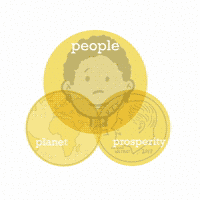
Environmental education is focused on creating a more sustainable future based on three intertwined pillars: environmental integrity, social equity, and shared prosperity. The notion of sustainability is built on the premise that that a sustainable future depends on all three because they are interdependent systems and over the long-term, our practices support present and future generations.
Transcript:
I'm Boris Simmons, and I'm the Director of the National Project for Excellence in Environmental Education, which is an initiative of the North American Association for Environmental Education (NAAEE). I'm also a researcher at the University of Oregon, in Eugene, Oregon.
We've been talking about the notion of sustainability within the environment for decades and decades because it was always that how can you make sure that the forest remains healthy off into the future? How can you make sure that the fisheries that different components of the environment remain healthy into the future? And so when I think about sustainability, towards environmental education in particular, what fascinates me and what I think is most important is rooting it in the Brundtland Report. So that notion of sustainable development, because it says that we need to meet the needs of the present without compromising the ability of future generations to meet their own needs.
You know, often people think about it in terms of a Venn diagram so that you're, you're looking at the overlapping interests of environmental integrity, social equity, and economic prosperity. And to me, that's really the key to sustainability because it says we need to be able to balance all three of these.
And I would actually go a little bit further, which is not a novel notion. There are certainly lots of other people who would add in cultural vitality. So you kind of have now a Venn diagram or a four-legged stool that has the cultural vitality, social equity, environmental sustainability, and economic prosperity with how all four of those come together to make us a more sustainable world.
I think it's always a danger when one of these terms gets out into sort of the truly public realm, especially within the realm of marketing, and what you have to be prepared to do is to ask the questions behind it. And look at well if you are a sustainable corporation, if this coffee came from, you know, some farm that has sustainable practices, what does that mean? And to me, that's what our job is for environmental education. It's to help people be able to ask those good questions.